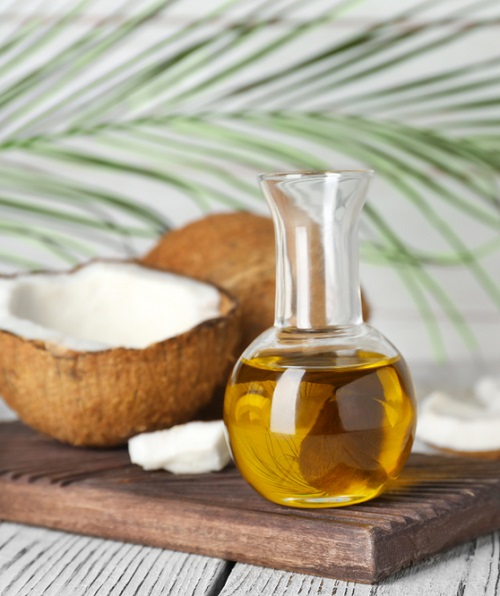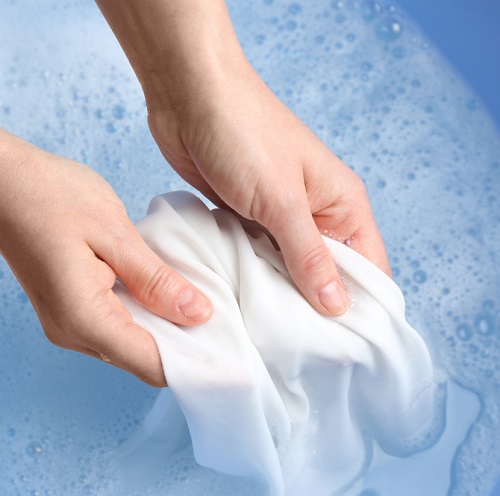Did those oil spills ruin your stylish outfit and leave you wondering—How To Get Coconut Oil Out Of Clothes? We have your back!
If you’ve ever spilled coconut oil on your favorite outfit, you know how frustrating it can be to get rid of the greasy stains. But don’t worry—we’ve got you covered with some simple and effective methods.
Learn How To Remove Castor Oil From Clothes Here
Does Coconut Oil Stain Clothes?
Coconut oil can indeed stain clothes, often leaving a subtle but stubborn mark. This is because it solidifies at cooler temperatures and seeps into fabric fibers. Natural fabrics like cotton and linen are more susceptible to these stains due to their absorbent nature, while synthetics may resist a bit more but aren’t immune. The visibility of the stain often depends on the fabric type and the amount of oil spilled.
Does Coconut Oil Come Out Of Clothes?

Yes, you can definitely get rid of coconut oil on clothes, but you need to act fast and use the right products. Coconut oil is an oil-based stain that is not water-soluble, so it can be tricky to remove from fabrics.
Also, you might have to wash the stained clothing in hot water with a heavy-duty detergent or an enzyme-based stain remover to ensure complete removal.
Get the Best Castor Oil Buyer’s Guide here
How To Get Coconut Oil Out Of Clothes?

Method 1: Use Dishwashing Soap Or Baby Powder
Dishwashing soap and baby powder aren’t just for dishes and babies. They’re great for cutting through grease, making them effective solutions for removing coconut oil stains from clothing.
- Scrape off any solid coconut oil from the stain with a spoon or a knife.
- Blot the stain with a paper towel to absorb as much oil as possible.
- Apply some dishwashing soap or baby powder directly to the stain and rub it gently with your fingers or a soft-bristled brush.
- Let the soap sit on the stain for 10 to 15 minutes. Rinse the stain with hot water and check if it is gone. If not, repeat the process until the stain is removed.
- Wash the garment as usual in the washing machine with a heavy-duty detergent.
Method 2: Soak in Baking Soda Or Cornstarch
For a natural approach, turn to baking soda or cornstarch. Their absorbent properties can draw out oil from fabric fibers, while also neutralizing any lingering odors.
- Remove extra deposition over the stained area and try to absorb as much oil as possible using tissue.
- Sprinkle some baking soda or cornstarch over the stain and soak.
- Brush off them and check if the stain is gone. If not, repeat the process until the stain is removed.
- Wash the garment as usual in the washing machine with a heavy-duty detergent.
Method 3: Pour Hydrogen Peroxide
Hydrogen peroxide can be a game-changer for light-colored fabrics, helping to remove coconut oil stains while brightening the material. Just remember to spot-test first, as it’s a mild bleach and can be harsh on some fabrics.
- Follow the basic guidelines provided in the ‘direction to use’ section.
- Pour some hydrogen peroxide over the stain and let it sit for 10 to 15 minutes. Repeat the process until the stain is removed.
Method 4: Spray with WD-40
Surprisingly, WD-40 does more than just squeaky hinges. It can break down coconut oil stains in fabrics. It might leave a residue, so do a spot test and follow the label’s directions.
- Spray some WD-40 over the stain and wait for half an hour.
- Blot the stain with a clean paper towel to remove the excess WD-40.
- Wash the garment with normal-temperature water.
Method 5: Rinse in Distilled White Vinegar
Distilled white vinegar isn’t just for salads; it’s a natural stain-fighting agent. It works wonders on acidic stains like coffee or fruit juice and can also help with odor removal, fabric softening, and color preservation.
- Dilute some distilled white vinegar with water in a ratio of 1:1 and pour it over the stain.
- Leave the vinegar on the stain for a few minutes.
- Rinse the stain with cold water.
Get a Detailed Buyer’s Guide of Castor Oil at Kroger here
Things To Keep In Mind
- Always opt for cold water when treating coconut oil stains. Hot water can set the stain, making it harder to remove.
- Swift action is important to prevent the oil from seeping deeper into the fabric. Address the stain as soon as possible after it occurs.
- Avoid rubbing the stain vigorously, as this can spread it further. Blot the stain gently with a clean cloth or paper towel to absorb excess oil.
- Always refer to the care label on your garment to ensure that it can be machine-washed and to follow any specific washing instructions provided by the manufacturer.
- Opt for a stain remover or laundry detergent specifically formulated for oil-based stains. Avoid using harsh chemicals that could damage the fabric.
- Before applying any stain remover or detergent, test it on a hidden area of the fabric to ensure it doesn’t cause discoloration or damage.
Discover the Castor Oil Side Effects here

